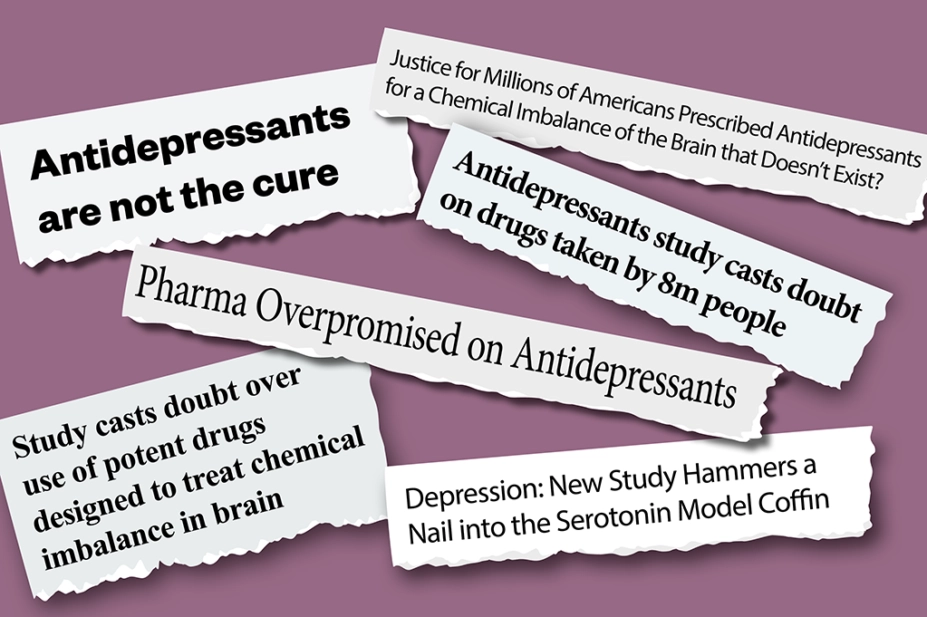
Mclean/Shutterstock.com
The serotonin theory of depression was originally mooted around 60 years ago[1].
Since then, it has been widely believed that depression is caused by an imbalance of serotonin and other chemicals, called neurotransmitters, in the brain.
This hypothesis is often used as justification for the use of antidepressants, specifically selective serotonin re-uptake inhibitors (SSRIs). For instance, the NHS website states that “it’s thought that SSRIs work by increasing serotonin levels in the brain” and this is often the explanation given to patients when they are offered the medication.
However, an umbrella review published in Molecular Psychiatry on 20 July 2022 may have changed all that[1].
The review concluded that there is no consistent evidence of there being an association between serotonin and depression, and no support for the hypothesis that depression is caused by lowered serotonin activity or concentrations.
The findings were reported widely, and somewhat enthusiastically, across the mainstream media and — although not a surprise to many experts — were met with astonishment from patients.
The problem is, the evidence is simply not there to provide a clear alternative explanation to patients about what causes depression (see Box), and mental health experts are concerned about the impact the study — and, more specifically, the way it has been reported — may have on patient trust and their willingness to take antidepressants going forward.
“It’s not entirely surprising,” says Nicola Greenhalgh, lead pharmacist for mental health at North East London NHS Foundation Trust.
“The study is quite clear and a relatively robust study, so I don’t think that the evidence that’s come out is what’s being questioned.
“What is being questioned is what that means and where it leaves people.”
‘Unproven abnormalities’
The researchers set out to evaluate all relevant studies considering the link between depression and lowered serotonin concentration or activity. They included 17 studies, the majority of which were systematic reviews and meta-analyses.
Overall, they said, most studies found no evidence of reduced serotonin activity in people with depression, compared to people without, and methods to reduce serotonin availability did not consistently lower mood in volunteers.
“This isn’t the first time that it’s been shown that serotonin is not the main, or only player, in depression,” says Greenhalgh.
This is probably the first time that we’ve had absolute definitive conclusive evidence that serotonin alone isn’t responsible for depression
Nicola Greenhalgh, lead pharmacist for mental health at North East London NHS Foundation Trust
“But this is probably the first time that we’ve had absolute definitive conclusive evidence that serotonin alone isn’t responsible for depression.”
According to the researchers, as many as 85–90% of the public believe that depression is caused by low serotonin or a chemical imbalance. This belief, they say, “shapes” how people understand their moods, leading to a “pessimistic outlook” on the outcome of depression and “negative expectancies” about the possibility of self-regulation of mood.
The authors also say that it influences patient decisions about whether to take or continue antidepressant medication, and may discourage them from discontinuing treatment, potentially leading to “lifelong dependence”.
“Our view is that patients should not be told that depression is caused by low serotonin or by a chemical imbalance, and they should not be led to believe that antidepressants work by targeting these unproven abnormalities,” said Joanna Moncrieff, a consultant psychiatrist and the lead author, in a press release accompanying the study.
“We do not understand what antidepressants are doing to the brain exactly and giving people this sort of misinformation prevents them from making an informed decision about whether to take antidepressants or not.”
This information isn’t particularly new; in fact, in 2019, a position statement from the Royal College of Psychiatrists stated clearly that the original idea that antidepressants correct a chemical imbalance in the brain is an “over-simplification”[2].
However, the findings of the 2022 study were quickly picked up in the national media, with headlines such as ‘Antidepressants study casts doubt on drugs taken by 8m people’ and ‘Depression ‘is NOT caused by low serotonin levels’: study casts doubt over widespread use of potent drugs designed to treat chemical imbalance in brain’ — sparking serious fears among patients that the condition has been overmedicalised for years[3].
But experts are concerned that the findings have not been properly understood and that this misunderstanding could have significant repercussions for the treatment of depression.
“This is partly the fault of the authors,” says David Taylor, director of pharmacy and pathology at the Maudsley Hospital and professor of psychopharmacology at King’s College London.
“It may well be that evidence relating to serotonin and depression is less than conclusive but that doesn’t mean that antidepressants don’t have useful efficacy.”
Taylor points out that many antidepressants have no effect on serotonin — for example, nortriptyline, lofepramine, iprindole and agomelatine — and one, tianeptine, is a serotonin re-uptake enhancer, meaning it performs the opposite action to SSRIs.
“It is also worth saying that drugs were not developed on the basis of an observed deficit of serotonin,” he continues.
“Antidepressants were accidently found to be effective and then their pharmacological effects were elucidated. Then it was assumed that depression must be caused by the opposite action of the antidepressant — if the antidepressant enhances serotonin function then depression must be a low serotonin disorder.
“The error, if indeed one has been made, is in that assumption,” he concludes.
While there is limited evidence regarding the efficacy of long-term antidepressant use, there is strong evidence that antidepressants — particularly SSRIs — can help relieve the symptoms of chronic depression for many individuals, as well as lead to significantly lower rates of relapse, or recurrence[2].
A 2018 systematic review and meta-analysis of 522 trials, comprising 116,477 patients, found that all antidepressants were more efficacious than placebo in adults with major depressive disorder[4]. Escitalopram, paroxetine and sertraline, all of which are SSRIs, were among those with the highest response and lowest dropout rates, compared to the other antidepressants assessed.
There is consistent evidence that antidepressant medicines can be helpful in the treatment of depression and can be life-saving
Michael Bloomfield, consultant psychiatrist and head of the Translational Psychiatry Research Group at University College London
And a 2017 “mega-analysis” of citalopram and paroxetine in adult depression found that patients taking either of the SSRIs reported a larger reduction in depressed mood than those given placebo, regardless of if they reported an adverse event or not[5].
“There is consistent evidence that antidepressant medicines can be helpful in the treatment of depression and can be life-saving,” says Michael Bloomfield, consultant psychiatrist and the head of the Translational Psychiatry Research Group at University College London[6].
“Antidepressant medicines are one type of treatment alongside other types of treatment like psychotherapy (talking therapy). Patients must have access to evidence-based treatments for depression and anyone taking any treatment for depression who is contemplating stopping treatment should discuss this with their doctor first.”
Commenting on the umbrella review, Phil Cowen, professor of psychopharmacology at the University of Oxford, highlights that the possible role of serotonin in depression was a “separate question” from the antidepressant effects of SSRIs[6].
“I was puzzled by the press release [for the 2022 study], which implies that antidepressant drugs could work only by correction of a prior corresponding chemical imbalance. No current theory of antidepressant action derived from either human or animal studies makes this assertion,” he adds.
Livia de Picker, a postdoctoral researcher in the Collaborative Antwerp Psychiatric Research Institute at the University of Antwerp, explains that recent research indicates that antidepressants affect several pathways and receptors in the brain, not just limited to serotonin[6].
“There is really no reason to question the effectiveness of current antidepressants, even if our understanding of the biological causes of depression moves away from theories focused solely on serotonin,” she adds.
Damage control
Since the study was published, Moncrieff has released additional commentary to provide further background on the study and to clarify that the study does not conclude that antidepressants do not work[7]. She also drives home the point that patients should not stop their antidepressants suddenly, or too fast, which can give rise to discontinuation syndrome.
However, the damage may already have been done; mental health specialists are concerned that patients taking antidepressants may now be questioning whether they want to continue taking them, regardless of the fact that their efficacy in some patients has been proven in clinical trials.
“We’re in a really difficult place anyway — there’s been quite a lot of negative press around antidepressants and discontinuation syndrome which, we are now aware, is much worse than we thought it was,” says Greenhalgh.
“The worry for us is we don’t have another option … even psychotherapy [and cognitive behavioural therapy] are not good for everyone; they’re not immediate and not everyone can engage or wants to engage.”
Greenhalgh adds that this may also be exacerbated by the stigma attached to depression, saying that the reports might be enough to “sway [patients] completely” into stopping or refusing to start antidepressants.
She suggests that it would be useful for some guidance to be published to ensure that prescribers are on the same page when it comes to appropriate messaging around antidepressants.
“GPs are the majority of people prescribing antidepressants … and to keep up to date with absolutely everything that you need to, it’s not easy, so I think something that’s really clear for those clinicians would be helpful, and maybe something for patients that [states] … what the actual facts are … and [recommends] what they should do if they’re worried.”
It’s vital that doctors treat the ‘whole person’ when supporting someone with depression and offer a range of appropriate treatments
Stephen Buckley, head of information, Mind
Responding to the umbrella review, the College of Mental Health Pharmacy (CMHP) reiterates that antidepressants remain “a lifeline” for many patients prescribed them.
“It is important that any patient taking antidepressants does not stop them suddenly but seeks advice if they are concerned about the current information,” the CMHP said in a statement.
Finally, Stephen Buckley, head of information at the mental health charity, Mind, says that if anyone taking antidepressants has any questions about their treatment, it is “always OK” to speak to their GP or pharmacist.
“It’s not well understood why SSRIs may help alleviate the symptoms of depression in some people, but not in others,” he adds.
“There is very little credible evidence to support the idea that depression itself is caused by some imbalance in brain chemistry. Childhood experiences, difficult life events or other physical or mental health problems are all potential causes of depression.
“It’s vital that doctors treat the ‘whole person’ when supporting someone with depression and offer a range of appropriate treatments.”
Box: What does cause depression?
Scientists are still working to understand the mechanism behind depression, but our knowledge around the condition has improved considerably since the 1960s — the biggest development being that it is no longer considered to be a single disease with a single cause.
“Today, it is largely accepted that depression is a heterogenous disorder with potentially multiple underlying causes,” explains Gitte Moos Knudsen, professor of neurobiology and chair of the department of neurology and neurobiology research unit at Copenhagen University Hospital[6].
Depression results from a complex interaction of social, psychological and biological factors[8].
It can be linked with childhood experiences, stressful life events, personality traits, family history, recreational drug and alcohol use, physical health problems and genetics. People with existing mental health conditions, such as an eating disorder or post-traumatic stress disorder, may also be more likely to experience depression.
As depression is often associated with a ‘negative bias’ in the way a person looks at the world and processes information, non-pharmacological interventions, such as cognitive behavioural therapy, can work by challenging automatic negative thoughts. The cognitive bias in depression can also be ameliorated with antidepressant drugs.
These factors are why a combination of antidepressants and talking therapies is often recommended as the best approach to treating depression.
- 1Moncrieff J, Cooper RE, Stockmann T, et al. The serotonin theory of depression: a systematic umbrella review of the evidence. Mol Psychiatry. 2022. doi:10.1038/s41380-022-01661-0
- 2Position statement on antidepressants and depression. Royal College of Psychiatrists. 2019.https://www.rcpsych.ac.uk/docs/default-source/improving-care/better-mh-policy/position-statements/ps04_19—antidepressants-and-depression.pdf?sfvrsn=ddea9473_5#:~:text=While%20there%20are%20fewer%20studies,as%20well%20as%20lead%20to (accessed 17 Aug 2022).
- 3Kendrick T, Collinson S. Antidepressants and the serotonin hypothesis of depression. BMJ. 2022;:o1993. doi:10.1136/bmj.o1993
- 4Cipriani A, Furukawa TA, Salanti G, et al. Comparative efficacy and acceptability of 21 antidepressant drugs for the acute treatment of adults with major depressive disorder: a systematic review and network meta-analysis. The Lancet. 2018;391:1357–66. doi:10.1016/s0140-6736(17)32802-7
- 5Hieronymus F, Lisinski A, Nilsson S, et al. Efficacy of selective serotonin reuptake inhibitors in the absence of side effects: a mega-analysis of citalopram and paroxetine in adult depression. Mol Psychiatry. 2017;23:1731–6. doi:10.1038/mp.2017.147
- 6expert reaction to a review paper on the ‘serotonin theory of depression’. Science Media Centre. 2022.https://www.sciencemediacentre.org/expert-reaction-to-a-review-paper-on-the-serotonin-theory-of-depression/ (accessed 17 Aug 2022).
- 7Moncrieff J. How to take the news that depression has not been shown to be caused by a chemical imbalance. Joanna Moncrieff. 2022.https://joannamoncrieff.com/2022/07/24/how-to-take-the-news-that-depression-has-not-been-shown-to-be-caused-by-a-chemical-imbalance/ (accessed 17 Aug 2022).
- 8Depression. World Health Organization. 2021.https://www.who.int/news-room/fact-sheets/detail/depression (accessed 17 Aug 2022).
2 comments
You must be logged in to post a comment.



It’s easy to understand how clinicians have become used to a simplified “serotonin” explanation of how antidepressants work - the reality is complex and ambiguous and may sound less reassuring to patients. However, many people take medicines when they don’t understand how they work. Paracetamol for example. So, perhaps we should focus on finding out what the patient already knows about their medicine, what they want to know and what they’re concerned about. Then we can have an individualised (person centred) consultation and come to a shared decision about the optimal course of treatment for that patient.
I think this article is a helpful summary, and tries to unpack some of the complexities surrounding this issue. I feel some of the responses by clinicians (not in this article!) have been slightly too defensive in saying "we don't use the chemical imbalance explanation with patients, so this is nothing new". I think if we are honest, it has previously been used quite commonly as a short-hand explanation (as Nina has mentioned in her comment). We need to reflect on that and refine our communication about antidepressant actions, understanding what each of our patients wants to know and what worries them. My other comment would be that a little more context about lead author Joanna Moncrieff would be relevant beyond describing her as a consultant psychiatrist. She's a prominent and longstanding critic of psychopharmacological approaches to treating mental illness, having published extensively in lay and scientific publications. I think that is relevant when reviewing this umbrella analysis and how it has been promoted.